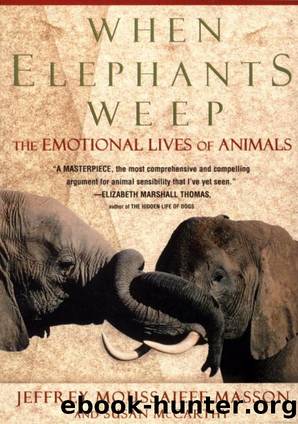When Elephants Weep: The Emotional Lives of Animals by Jeffrey Moussaieff Masson

Author:Jeffrey Moussaieff Masson [Masson, Jeffrey Moussaieff]
Language: eng
Format: epub
Tags: Animals, Nonfiction, Education
ISBN: 9780307574206
Google: TqxjMVBNEAsC
Amazon: 0385314280
Publisher: Delta
Published: 1996-05-02T04:00:00+00:00
The sense of beauty is not usually defined as an emotion. Yet it does not seem to be a wholly intellectual experience. Sometimes beauty makes people happy, sometimes sad; perhaps the experience is partly cognitive and partly emotional. Human beings have certainly always preferred to reserve the appreciation of it exclusively for our own species.
The chimpanzees who w^atched the sundown with Geza Teleki were not unique. The primatologist Adriaan Kortlandt recorded a wild chimpanzee gazing for a full fifteen minutes at a particularly spectacular sunset until darkness fell. Some who have observed
192
BEAUTY, THE BEARS, AND THE SETTING SUN
bears in the wild speak of them sitting on their haunches at sunset, gazing at it, seemingly lost in meditation. From all appearances it would seem that the bears are enjoying the sunset, taking pleasure in the aesthetic experience. Scientists laugh at the naivete of this interpretation. How could a bear be capable of aesthetic appreciation, a contemplative state? Some aesthetes also believe other people are incapable of such a state, or such a refined one; many nineteenth-century scientists claimed that "lower" races could not enjoy the same aesthetic emotions that they (as members of "higher" races) could. One can doubtless go too far with this, listening, for example, to a bear exhaling and claiming that he is sighing with melancholy awareness of the transience of things, observing his world and thinking that one day he will no longer be present to witness such beautyâan ursine Rilke. Momentary awareness of his own mortahty is almost impossible to prove; a sense of beauty is easier.
Why should any creature have a sense of beauty? Some have claimed that human artistic creativity is rooted in exploratory play. Perhaps a sense of beauty rewards us for making our way through the world and for turning our senses upon it. Finding one's children and other loved ones beautifal is valuable. In a broader sense we may have evolved to see the world around us as beautifal, to enjoy gazing on it, listening to it, breathing it in, moving through it, feeling and tasting it. Perhaps it serves no useful purpose beyond the satisfaction it inherently provides, a value in itself.
Before an animal can find beauty in some set of sensations, sounds, or images, it must be possible for the animal to detect these things physically, to sense them and to perceive them. Animal senses are poorly understood but seem to be tremendously variable.
It is often said that animals, or some of them, are color-blind. This strangely counterintuitive assertion has been widely repeated as scientific fact for decades and has made its way into some textbooks. Despite numerous articles in the scientific and popular press reporting color vision in animals (including dogs), the idea that animals can see in color is still frequently described as a "myth."
Humans do have excellent color vision. Along with many
HT1E' ELEPK-iNTS HT.F.P
Other primates, we are classified by optical scientists as trichromats, which means that we construct the range of colors we see from three basic colors.
Download
This site does not store any files on its server. We only index and link to content provided by other sites. Please contact the content providers to delete copyright contents if any and email us, we'll remove relevant links or contents immediately.
The Art of Thinking Clearly by Rolf Dobelli(10455)
Mindhunter: Inside the FBI's Elite Serial Crime Unit by John E. Douglas & Mark Olshaker(9324)
Change Your Questions, Change Your Life by Marilee Adams(7761)
Nudge - Improving Decisions about Health, Wealth, and Happiness by Thaler Sunstein(7694)
Mastermind: How to Think Like Sherlock Holmes by Maria Konnikova(7324)
The Power of Now: A Guide to Spiritual Enlightenment by Eckhart Tolle(5760)
Men In Love by Nancy Friday(5234)
Altered Sensations by David Pantalony(5094)
Factfulness: Ten Reasons We're Wrong About the World – and Why Things Are Better Than You Think by Hans Rosling(4737)
The Confidence Code by Katty Kay(4251)
Thinking in Bets by Annie Duke(4218)
Man and His Symbols by Carl Gustav Jung(4131)
The Worm at the Core by Sheldon Solomon(3486)
Why Buddhism is True by Robert Wright(3447)
Liar's Poker by Michael Lewis(3442)
Three Women by Lisa Taddeo(3425)
The Inner Life of Animals by Peter Wohlleben(3311)
Descartes' Error by Antonio Damasio(3271)
How Music Works by David Byrne(3262)
